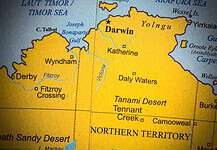Abbot Point Operations celebrates 40 years of safe ship loading at NQXT

Abbot Point Operations (APO) is celebrating four decades of safe and responsible operations at the North Queensland Export Terminal, Australia’s most northern deepwater export port.
It was this week in 1984 when the Fukukawa Maru arrived at the Terminal, located north of Bowen in Queensland, to load 60,000 tonnes of coking coal from the Collinsville mine, destined for Hong Kong.
Yesterday the BBG Liuzhou was the 6,902nd ship to safely berth at the Terminal and load high-quality coal from Bowen or Galilee basin mines for export to the world.
Abbot Point Operations General Manager Port Operations Allan Brown said the milestone was a credit to the hundreds of local workers who had maintained the Terminal for more than a generation.
To celebrate, the 400-strong APO team held a special morning tea, complete with themed cake, and gave out APO gift packs to train drivers and mariners visiting the Terminal.
“Our people are our business, and they are the foundation of 40 years of dedicated best practice in operating and maintaining this critical piece of national infrastructure,” Mr Brown said.
“From the production crew to the pilots, the tradespeople to the train drivers, and the engineers to the enviros, each member of our dedicated team has played a vital role in shaping the success story of the North Queensland Export Terminal.”
“We’re proud of our role in helping transport high-quality Queensland metallurgical and thermal coal to the world where it advances development and provides affordable and reliable energy that lifts people out of poverty.”
“And as Bowen locals we are equally proud of our efforts to ‘Grow Local’ and provide jobs, training, and corporate giving that contribute to the economic and social fabric of our community.”
“It’s been wonderful to come together as a team to celebrate this milestone, reflect on the journey so far, as well as chart a course for the next 40 years.”
APO manages world-class water monitoring, marine sediment, air quality, pests and weeds, and workplace safety programs at the Terminal. The business also partners with North Queensland Bulk Ports and First Nations traditional owner business, Juru Enterprises Limited, to deliver initiatives like the Collaborative Turtle Monitoring Program.
The business has a more than 30-year training tradition in educating apprentices to maintain a future workforce, as well as build skills locally, and APO’s Community Support Program provides more than $300,000 a year in donations and partnerships to eligible community groups, organisations, and initiatives in the Whitsunday Regional Council communities of Bowen and Collinsville.
The North Queensland Export Terminal (NQXT), then called the Abbot Point Coal Terminal, opened in 1984 with an annual export capacity of 6.5 million tonnes per year. The Terminal was built in partnership between Mount Isa Mines and the Harbours Corporation of Queensland to open export access for coal producers in the Bowen Basin.
Today, the NQXT has a nameplate capacity of 50 million tonnes per year following upgrades over the Queensland Government undertook over the years, and services mines in both the Bowen and Galilee basins.
Bravus took stewardship of NQXT in 2011 after acquiring a 99-year lease over the Terminal and its supporting infrastructure from the Queensland Government for $1.8 billion.
In 2016, the Queensland Government declared the Port of Abbot Point, which the Terminal is located within, a Strategic Port, noting its role as an essential element of national and state transport networks and supply chains.
The same year, Bravus acquired APO and the operating rights for the Terminal.







































